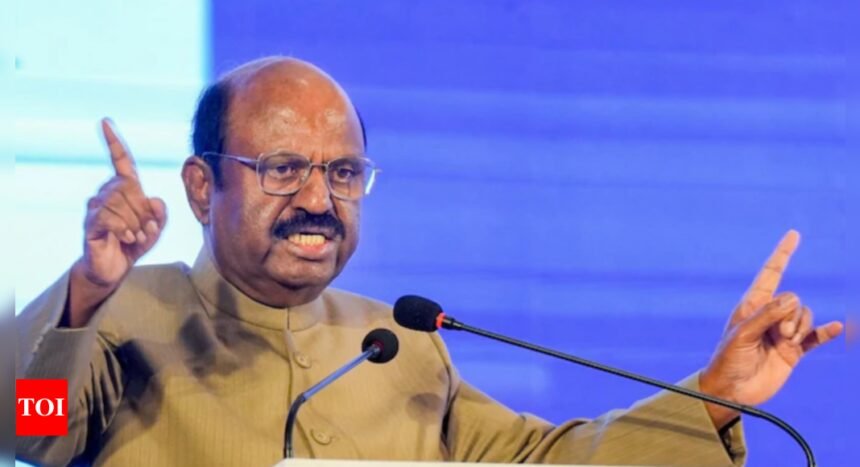NEW DELHI: West Bengal governor CV Ananda Bose on Thursday said he sees the current contingent of Kolkata Police posted at Raj Bhavan as a “threat” to his security.
“I have reasons to believe that the presence of the current officer-in-charge and his team is a threat to my personal security,” Bose told news agency PTI.
“I have informed Bengal CM Mamata Banerjee that I am insecure with Kolkata Police in Raj Bhavan, but there was no action,” he said.
The West Bengal governor’s statement comes days after he called for the Kolkata Police team to leave Raj Bhavan campus.
Police officers, however, remained at their posts as the Lalbazar official said no communication had been received from Raj Bhavan on the matter.
According to a Raj Bhavan official, a letter was sent to the relevant state government authority.
At a press meet on Friday, Bose had expressed his displeasure at victims of poll violence being denied entry to Raj Bhavan despite being granted requisite permission. He had sought a reply from CM Mamata Banerjee, alleging that Kolkata Police had tried to prevent him from carrying out his duty as governor.
On Monday morning, Raj Bhavan officials requested closure of the police outpost at the North Gate, but cops said they could not leave without a directive from Lalbazar.
Additionally, Bose wanted to set up a Jana Manch near the gate, but the police team refused, citing that Raj Bhavan was in a high-security zone with prohibitory orders under Section 144 CrPC permanently imposed around it.
Sources said the governor wanted the team of over 100 Kolkata Police personnel to be removed, suspecting that they were keeping tabs on him. Bose already receives Z category security from CRPF; Kolkata Police is posted only in the outer ring.
An official said since Raj Bhavan was a state-owned heritage property maintained by the PWD, it was the duty of Kolkata Police to guard the area, which it had been doing since 1866. Additionally, several cabinet ministers reside on the campus. The governor, therefore, could not give police marching orders at whim, the official said, hinting that the state may seek legal opinion on the matter if needed.
“I have reasons to believe that the presence of the current officer-in-charge and his team is a threat to my personal security,” Bose told news agency PTI.
“I have informed Bengal CM Mamata Banerjee that I am insecure with Kolkata Police in Raj Bhavan, but there was no action,” he said.
The West Bengal governor’s statement comes days after he called for the Kolkata Police team to leave Raj Bhavan campus.
Police officers, however, remained at their posts as the Lalbazar official said no communication had been received from Raj Bhavan on the matter.
According to a Raj Bhavan official, a letter was sent to the relevant state government authority.
At a press meet on Friday, Bose had expressed his displeasure at victims of poll violence being denied entry to Raj Bhavan despite being granted requisite permission. He had sought a reply from CM Mamata Banerjee, alleging that Kolkata Police had tried to prevent him from carrying out his duty as governor.
On Monday morning, Raj Bhavan officials requested closure of the police outpost at the North Gate, but cops said they could not leave without a directive from Lalbazar.
Additionally, Bose wanted to set up a Jana Manch near the gate, but the police team refused, citing that Raj Bhavan was in a high-security zone with prohibitory orders under Section 144 CrPC permanently imposed around it.
Sources said the governor wanted the team of over 100 Kolkata Police personnel to be removed, suspecting that they were keeping tabs on him. Bose already receives Z category security from CRPF; Kolkata Police is posted only in the outer ring.
An official said since Raj Bhavan was a state-owned heritage property maintained by the PWD, it was the duty of Kolkata Police to guard the area, which it had been doing since 1866. Additionally, several cabinet ministers reside on the campus. The governor, therefore, could not give police marching orders at whim, the official said, hinting that the state may seek legal opinion on the matter if needed.








